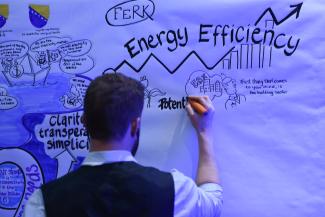July 2017—You might not see how energy efficiency has an effect on you, your life or business, but you will feel it. You will feel it because saving energy is one of the few things that can save you money, improve the economy, protect the environment, strengthen energy security, and enhance the overall quality of life.
In the Federation of Bosnia and Herzegovina (BiH), one of two governing entities in the country, these benefits are finally possible with the passage of its Energy Efficiency Law earlier this year. Bringing the law over the finish line to final adoption—after it sat untouched in Parliament for four years—took an extra-strength push from the bottom up and the top down. USAID was a major force behind both.
Adoption of the law means that energy efficiency planning and investment, and benefits to citizens, can begin. Now a majority of cantons and other local governments can—and must—start developing energy efficiency action plans.
“The adoption of the law enables the implementation of new energy efficiency activities, and the increased investments will benefit numerous sectors,” said Hamed Ramic, general manager of Euro-Asfalt and president of the Civil Engineering and Building Materials Industry Association of the FBiH Chamber of Commerce. “For example, energy efficient materials can be produced right here in BiH, along with other auxiliary materials that are already produced locally. I also anticipate that existing companies will expand and new ones will be established.”
The investment potential in BiH is as high as 5 billion BAM (Bosnian marks, or $2.8 billion), but energy efficiency is not just a money-saver and magnet for investment. It creates jobs, too.
“A large number of construction companies and other services will see new business, which will result in significant hiring of local workers,” Ramic said.
USAID, through its Energy Investment Activity (EIA), developed a joint approach to gaining acceptance of the new legislation, drafting a letter of support to the House of Peoples in December 2016 urging passage of the law. The letter was co-signed by U.S. Ambassador to BiH Maureen Cormack along with the ambassadors of the U.K., Germany, Sweden and the European Union as well as the U.N Development Program resident representative.
While EIA worked with the government and donors, USAID’s Civil Society Sustainability Project engaged citizens to support passage of the law. Garnering support from 56 municipalities, the project’s EFEKT Network, a civil society coalition that promotes sustainable energy in BiH, continuously advocated for adoption, sending more than 100 letters and organizing as many meetings with members of Parliament. On behalf of the network, the Center for Development and Support from Tuzla provided amendments to improve the law.
On Earth Day 2016, EFEKT staged a street performance called “Energy Efficiency (r)Evolution” in front of the BiH Parliament building, urging authorities to adopt the law. The performance conveyed the fact that BiH is lagging behind the world in environmental protection, and that citizens feel the consequences daily.
All of these efforts proved successful when the House of Peoples voted for passage of the law on Feb. 2, 2017. Very few economic sectors in BiH have such clear “win-win” potential as the energy efficiency sector in terms of benefits to public and private stakeholders.
LINKS
,“A large number of construction companies and other services will see new business, which will result in significant hiring of local workers.”

